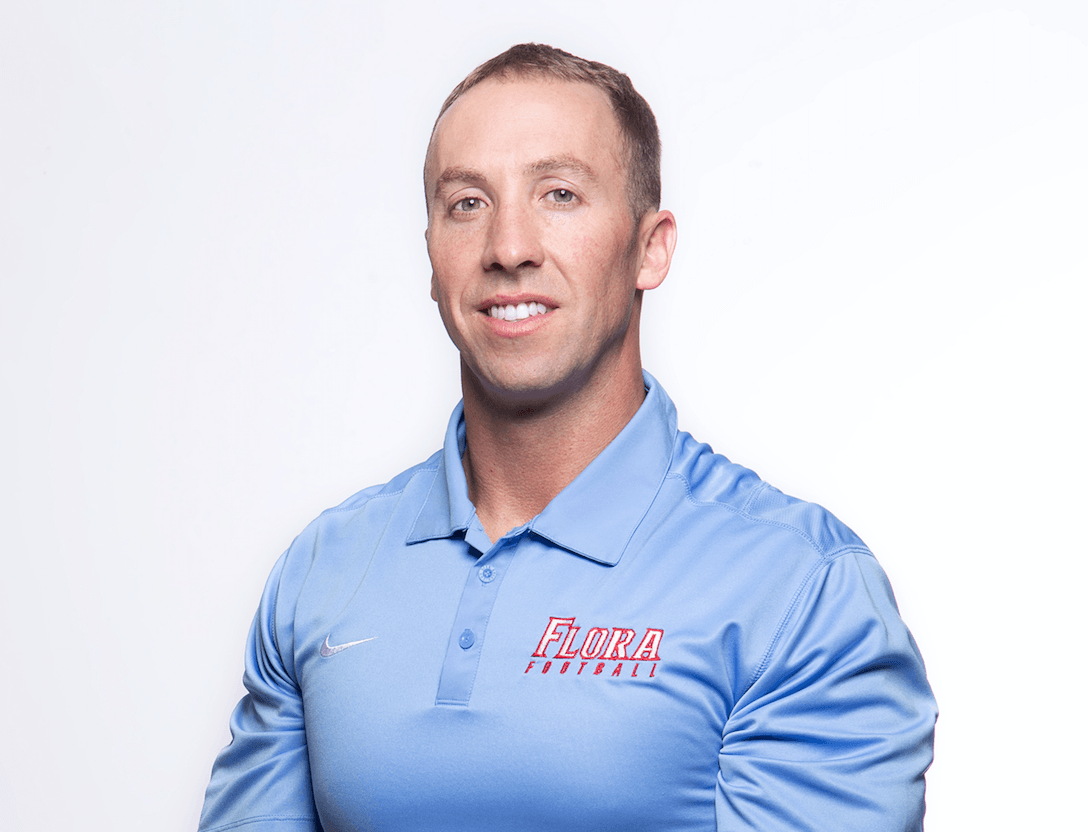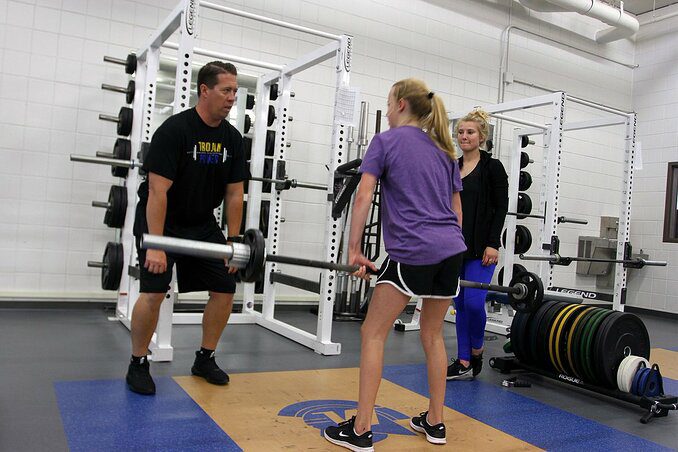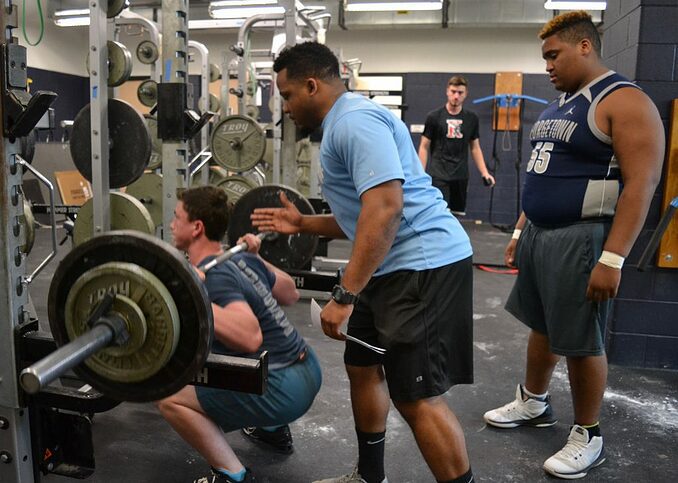5 Reasons Every High School Should Hire a Full-Time Strength Coach
Sports Performance | Strength & ConditioningABOUT THE AUTHOR


Micah Kurtz
Micah Kurtz was named the 2016 National Strength Coach of the Year by the NSCA. Micah has just started a new position as Assistant Athletics Director/ Director of Strength, Conditioning & Athletic Development at Windermere Preparatory School. Previously, he spent 9 years as the Director of Strength, Conditioning and Athletic Development at AC Flora High School in Columbia, South Carolina. In the past 5 years, the school has won 12 state championships and the school was named the #1 athletic program of the year by The State newspaper in both 2014 & 2015. Coach Kurtz also serves as the Strength and Conditioning Consultant Coach to the 9-time high school basketball national champion Oak Hill Academy. In this position, he designs and assists in the implementation of the team’s comprehensive long-term athletic development program. Kurtz was also named the South Carolina High School Strength Coach of the Year in both 2013 & 2014 by the state coaches association. He is an active speaker at strength and fitness conferences across the U.S. and has delivered presentations in China, Hong Kong and Mexico. Additionally, he assists both USA Football and USA Basketball in athletic development education. Kurtz is the state director for both the NSCA and the NHSSCA. You can connect with him on Instagram or visit his website www.TheAthleteMaker.com
There is no better place to arm young people with the tools to be successful in life than through a training program in the weight room. And there is no better person to faciliate this growth and learning process than a full time, qualified strength and conditioning professional.
The strength coach is an individual with the education and knowledge to best develop and progress students through age-appropriate wellness and long-term athletic development programs.
They will provide countless benefits for all students. And here’s why:
// 1. A Strength Coach Teaches Students To Chase Their Dreams & Maximize Their Life Potential
Weight training class can be the most important class a student will ever take in high school.
A weight training class is not the most important because it teaches students how to live a healthy lifestyle (though it does).
A weight training class is not the most important because it teaches students the importance of exercise and how to implement their own exercise programs for the rest of their lives (though it does).
Weight training class is not the most important class because child and adult obesity is one of the biggest epidemics in our society, and this generation of youth is the first generation that is NOT expected to outlive their parents’ generation, and 65% of our nation’s adults are overweight/obese, and at least 10% of the population has type 2 diabetes (though this is all true).

Weight training class is the most important class students will take because it teaches them life lessons and provides them with the experiences necessary to maximize their potential in life, arming the student with the self-confidence and character traits necessary to chase their dreams.
Unlike any class or sports field, the weight room allows the unique opportunity to teach students how to maximize their physical potential while also equipping them with the confidence to pursue whatever excites them throughout their entire athletic, academic, and professional careers.
“…the weight room allows the unique opportunity to teach students how to maximize their physical potential while also equipping them with the confidence to pursue whatever excites them throughout their entire athletic, academic, and professional careers.”
You could even argue that for this reason alone schools should hire qualified strength and conditioning coaches and make wellness and weight training classes a priority in their curriculum.
A strength coach, who is around young athletes all year and concerns himself or herself with each individual’s personal development, can have one of the biggest impacts on a young kid’s life.
Billy Graham said, “A coach will impact more people in one year than the average person will in an entire lifetime.”
And the training environment goes well beyond just improving a student’s athletic performance.
The weight room teaches students to overcome fears and persevere. Unlike traditional grading systems and athletic competitions, which are so often comparative and yield winners and losers, a proper strength and conditioning program tracks personal progress and teaches students to embrace the process of becoming the best at getting better every day.
No one walks into the weight room for the first time with the knowledge and strength to excel, but everyone walks out of the weight room with a sense of accomplishment.
In the weight room, effort is often the most respected attribute by your peers.
The weight room provides a unique opportunity for students to support and encourage others, not only by their words, but also by their actions and attitudes. There is no easier place to lead by example than in a weight room, where effort and dedication are so visible. Here, students quickly learn that energy and effort (both positive and negative) are contagious and can be spread in multiple ways (verbal and non-verbal).
These are life skills that students can apply to any endeavor they may encounter the rest of their life.
// 2. A Strength Coach Provides Knowledge & Expertise In Long-Term Athletic Development, Kinesiology & Exercise Science
Given the importance of strength coaches’ teaching and influence, school administrators should feel compelled to provide their students with strength coaches who have:
- A deep understanding of fundamental movement patterns
- Knowledge in exercise science
- An understanding of how to properly structure a long-term athletic development program that involves large groups
- The ability to progress students based on age, ability, and movement competencies
Many high schools now offer strength and conditioning/weight training classes during the school day. But most schools do not have a written curriculum in place for this class.
Teaching proper fundamental movement patterns and weight lifting progressions is extremely important and can be very difficult at the high school level. Progressing or regressing a student takes an experienced, educated, and qualified coach.


We have MANY GREAT coaches and P.E. teachers in the U.S., yet many of these people do not have backgrounds and education in exercise science or strength and conditioning.
So many of these weight training classes and after school strength and conditioning programs can become unsafe environments where students are performing highly specialized and technical movements without the proper understanding of mobility, stability, or the movement competencies needed to perform these exercises.
Fortunately, the National High School Strength Coaches Association (NHSSCA) & the National Strength and Conditioning Association (NSCA) are both currently working on educating and empowering all high school coaches and teachers involved in their school’s athletic development.
// 3. A Strength Coaches Has The Ability To Design An Athletic Development Program For Individual Students
A coach must consider many factors when designing a program. At the high school level, a strength and conditioning coach should break their athletic development program into different blocks or levels.
There is a huge difference between training a 13 to 14-year-old freshman versus an 18 to 19-year-old senior. It is a big red flag if your child comes home and excitedly announces their coach has them performing the same training program as the local university or professional team.
Collegiate and professional athletes are much older and more advanced, so their programs should be designed differently than a high school student’s program.
An athletic development program needs to be age appropriate. There are several factors to consider when determining an age appropriate program. These include:
- Birth Year Age
- Developmental Age
- Training Age
// 4. A Strength Coach Positively Affects Academics
A quality strength and conditioning program led by a qualified full-time coach goes well beyond improving physical performance and instilling life-long character development. There is overwhelming evidence validating that physical activity improves brain function, including a profound positive impact on mental health.
The research shows that students perform better in the classes immediately following their strength, conditioning and fitness classes. In a 2007 study, German researchers found that people learn vocabulary words 20% faster following exercise.
Having properly designed strength and conditioning classes during the school day will IMPROVE student test scores.
// 5. A Strength Coach Knows Weight Training Can Be Dangerous
Strength and conditioning can be dangerous. If a student is not doing what they are supposed to be doing or being poorly instructed in the weight room, someone can be seriously injured or die.
As Fred Eaves says, “If a student isn’t doing what he’s supposed to do in math class, he fails the test; however, if a student isn’t doing what he is supposed to in the weight room, someone could die.”
Unfortunately, we have had recent incidents in the U.S. where high school students have died while training.
Those deaths were preventable.
Given the enormity of the consequences when something goes wrong, it is imperative that strong policies be created and followed at all times. Coaches with a background in program design and training progressions have knowledge that minimizes risks to young people.
Schools and local governments would not consider hiring a lifeguard or athletic trainer who does not have education or credentials in their respective subject matter.
Unfortunately, at many schools across the United States, we have coaches that do not have an education or certification related to athletic development or strength and conditioning. This is not sound practice.
School administrators need to realize this and place a greater emphasis on hiring full-time, qualified strength and conditioning professionals.
// So Hire A Full-Time Coach
Our goal is that high schools across the United States and the world understand and appreciate the amazing benefits that a full-time, dedicated strength and conditioning professional can bring to their school and community.
“There is no better breeding ground for being a success in life than the weight room.” – Ron McKeefery
We hope all schools will hire full-time professionals that will work with the PE teachers and team sport coaches to integrate a unified and comprehensive long-term athletic development program at the high, middle, and elementary school levels.
Are you a better coach after reading this?
More coaches and athletes than ever are reading the TrainHeroic blog, and it’s our mission to support them with useful training & coaching content. If you found this article useful, please take a moment to share it on social media, engage with the author, and link to this article on your own blog or any forums you post on.
Be Your Best,
TrainHeroic Content Team
HEROIC SOCIAL
HEROIC SOCIAL
TRAINING LAB
Access the latest articles, reviews, and case studies from the top strength and conditioning minds in the TH Training Lab

